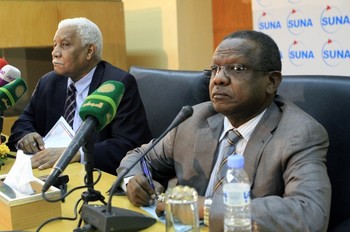Sudan leaves door open for rollback of oil shutdown decision
June 9, 2013 (KHARTOUM) – The Sudanese government today qualified president Omer Hassan al-Bashir decision to halt oil flow from South Sudan by saying that the latter can rectify the situation and avert the shutdown by suspending support to Sudan Revolutionary Front (SRF) within the next 60 days.

Bashir made the surprise announcement on Saturday at a rally north of the capital Khartoum.
“O’ Awad [oil minister] tomorrow direct oil companies to close the pipeline and after that let them [South Sudan] take it via Kenya or Djibouti or wherever they want to take it”, the Sudanese president said.
“The oil of South Sudan will not pass through Sudan ever again,” Bashir added.
The Sudanese president said the decision was taken after thorough study to examine its advantages and drawbacks.
Osman pointed out that the 60 days timeframe is included as a clause in the agreements signed between Khartoum and Juba should either side decide to annul it.
He further said that the government will allow a batch of South Sudan oil which arrived in Port Sudan via the pipelines last Saturday to be exported to international markets and that Khartoum will get its share according to the agreement.
The spokesman also declared that all nine cooperation agreements signed last year with Juba will be cancelled and not only the oil portion.
In September of last year, both Sudan and South Sudan signed a series of cooperation agreements, which covered oil, citizenship rights, security issues, banking, border trade among others.
However only last March, the two countries signed an implementation matrix for these deals which was hailed as a major breakthrough in the mostly tense relations between the two ex-foes.
The most notable provision in the agreement is related to resumption of oil exports by landlocked South Sudan which were suspended more than a year ago because of a dispute over transit fees. Oil started flowing again in April.
Sudan’s director of the National Intelligence and Security Services (NISS), Mohamed Atta al-Moula Abbas, speaking alongside the government spokesperson, reiterated Khartoum’s accusations to South Sudan of supporting and harboring SRF insurgents.
Abbas also claimed that Juba is occupying six Sudanese border areas and also emphasized that the decision to block South Sudan oil is irreversible.
He underscored mentioning that sparing Sudanese lives is more precious than the 350,000 barrels of oil produced by Juba.
The NISS director went to detail the alleged level of support provided by South Sudan to SRF rebels saying that Juba provided the rebels with 100 barrels of fuel last Friday along with an extra 100 barrels on the same day from the Unity state.
“They believe that we have spies within the SRF who provide us with information so they transferred fuel to an area near Troje and it will arrive today or tomorrow” Abbas said. He added that “the transfer of fuel to the rebels is run under the direct supervision of the southern army’s chief of staff and the intelligence director”.
He further revealed that Juba provided military reinforcements to SRF rebels including four-wheel drive vehicles, spare parts, ammunition and weapons, food supplies and identity documents. In addition to that, dozens of SRF injured fighters were transferred to hospitals in unity state.
Abbas went on to describe Juba’s support to SRF as “systematic” and not temporary, adding “whenever we asked South Sudan to refrain from supporting SRF, their support becomes even larger”.
SOUTH SUDAN CABINET MEETS
South Sudan cabinet held an emergency meeting on Sunday and discussed the threat coming from Sudan to shut down the oil flow.
The minister of information and official spokesman of the government, Barnaba Marial Benjamin, after the meeting warned Khartoum of abrupt closure of oil pipeline as it would result to environmental catastrophe.
He further explained that the abrupt shutdown would bring pressure on the pipeline and can cause the oil to overflow and may spill into the River Nile, causing harm to millions of people.
The River Nile water flows in the south-north direction from South Sudan to Egypt through Sudan.
The cabinet will further discuss the matter on Monday and continue to deliberate on the matter.
(ST)
